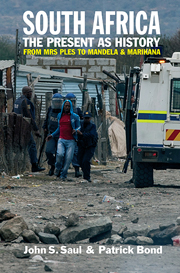Book contents
- Frontmatter
- Dedication
- Contents
- Introduction: South Africa in History
- Part I What's Past is Prologue: From the Beginnings to 1994
- Part II The Present as History: Post-Apartheid and Post-1994
- Part III Conclusions: The Future as History
- 6 Uneven and Combined Resistance: Marikana and The Trail to ‘Tunisia Day’ 2020
- 7 Liberating Liberation: The Struggle against Recolonization in South Africa
- Bibliography
- Index
6 - Uneven and Combined Resistance: Marikana and The Trail to ‘Tunisia Day’ 2020
from Part III - Conclusions: The Future as History
Published online by Cambridge University Press: 05 December 2015
- Frontmatter
- Dedication
- Contents
- Introduction: South Africa in History
- Part I What's Past is Prologue: From the Beginnings to 1994
- Part II The Present as History: Post-Apartheid and Post-1994
- Part III Conclusions: The Future as History
- 6 Uneven and Combined Resistance: Marikana and The Trail to ‘Tunisia Day’ 2020
- 7 Liberating Liberation: The Struggle against Recolonization in South Africa
- Bibliography
- Index
Summary
The prior two chapters showed how the wholehearted embrace of neo-liber-alism by the African National Congress from the early 1990s left the economy especially fragile, reliant upon asset bubbles and subject to capital flight at the first sign of trouble. Although from 1993–2008 there was technical GDP growth each year, it was terribly stilted. Although South Africa technically began recovering from formal recession in late 2009, this did not reverse the economic rot: i.e., the rise of mass unemployment, further property market turmoil, manufacturing stagnation, a severe credit squeeze and a return to dangerous current account deficits (as the big extractive and financial corporations shipped out funds to London, and as trade slipped into deficit, too). As inequality increased and reports became more frequent of corporate managers ‘earning’ millions of dollars in salary and perks, South Africa became a microcosm of growing global concerns about the ‘1 per cent’ versus the ‘99 per cent’.
One of the most visible representatives of the latter was Congress of SA Trade Unions (COSATU) general secretary Zwelinzima Vavi. He regularly articulated the limits of worker patience during his long career in trade-union leadership, although in the second half of 2012 this role was constrained by shifting power balances and in mid-2013 he became embroiled in a major controversy concerning his sexual behaviour with a subordinate, leaving the momentum within the left of the labour movement to be forged by the National Union of Metalworkers of South Africa (NUMSA).
- Type
- Chapter
- Information
- South Africa - The Present as HistoryFrom Mrs Ples to Mandela and Marikana, pp. 213 - 242Publisher: Boydell & BrewerPrint publication year: 2014

